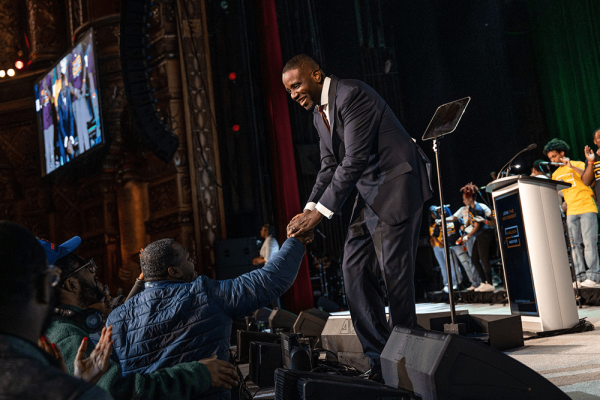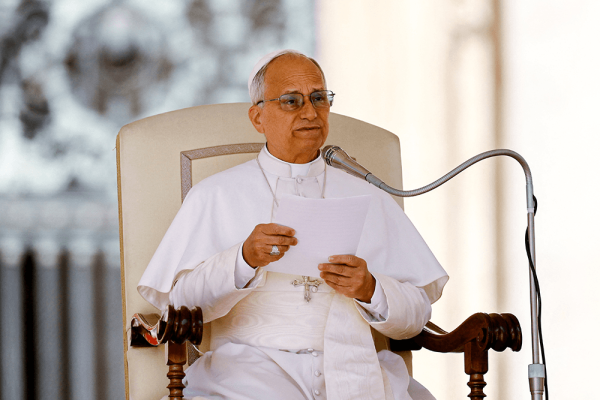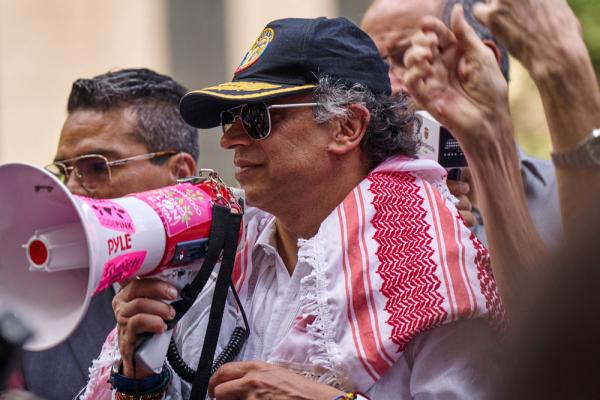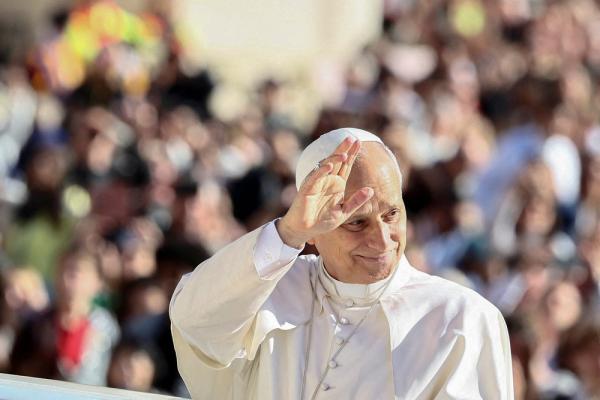For the first time in more than 10 years, Detroit will choose a new mayor without an incumbent on the ballot. Among the candidates are a City Council president, a nonprofit leader, a former police chief, and a reverend.
The Rev. Solomon Kinloch gained early traction as a spiritual leader and community-first candidate. Recent polling shows Kinloch in tight competition for second or third place as Detroit heads into a tightly contested primary on Aug. 5.
Kinloch currently leads Triumph Church, a large, multisite congregation with seven campuses and 40,000 members across the region. He has led Triumph Church since 1998 and has stated he intends to retain his pastoral duties if elected. His long tenure pastoring a large church body is part of Kinloch's appeal to be a credible candidate for public office. But that same tenure raises questions among some potential constituents about his willingness to defend the rights of LGBTQ+ Detroiters.
According to Triumph Church’s website, the church’s beliefs on marriage state: “We believe that God wonderfully and immutably creates each person as male or female and that those two distinct, complementary genders together reflect the image and nature of God. We believe that God created marriage to be exclusively the union of one man and one woman and that intimate sexual activity is to occur exclusively within that union.”
For queer people in Detroit, these beliefs are troubling.
READ MORE: Don’t Ask AI Your Questions About Faith
An estimated 131,000 LGBTQ+ adults live in Detroit, according to a 2021 study from the Williams Institute — 131,000 voices, votes, and potential constituents looking for candidates who will advocate for them. The question is, if Rev. Kinloch’s church does not embrace queer people, would a Mayor Kinloch?
In a statement to Sojourners, Rev. Kinloch’s campaign said: “Love is love. I would never tell anyone who they should love, or who they can marry. I will be a mayor for all Detroiters, whether gay or straight, Black or white, young or old.”
Rev. Kinloch’s statement said he would support people’s right to “exercise their freedom to find happiness.”
“As mayor, I would defend the rights of all Detroiters and fight vigorously against injustice toward our LGBTQ community,” the statement reads. “We have to build an inclusive city, one where every citizen feels valued and respected, and as mayor, that’s exactly what I will do.”
But those who work at the intersection of faith and LGBTQ+ rights said there is a disconnect between the pastoral and mayoral position.
“People who will allow their congregation to believe one thing about them, but then running for office will name that they believe something else, I think they’re dangerous,” said Rev. Jermell Witherspoon, executive director of AllianceQ, a national nonprofit that works to make the Disciples of Christ congregation more inclusive of all gender identities and sexual orientations.
“We are living in a time now where we cannot afford to bring anyone else into our spaces who do not affirm the fullness of who we are, or who might put something in place that will destroy us,” Witherspoon said.
According to local leaders, Kinloch’s stated commitment to Detroit’s LGBTQ+ community hasn’t been reflected in his campaign. Jerron Totten, chair of the Michigan Democratic Party’s LGBT and Allies Caucus, told Sojourners that the caucus reached out to Kinloch’s campaign prior to their endorsement process and received no response. The caucus endorsed Saunteel Jenkins, a former City Council president and nonprofit leader. Totten also said that Robin Kinloch, Kinloch’s wife, attended Motor City Pride in his place.
“LGBTQ people are being attacked at the federal level and at the state level. Our last line of defense is our local government,” Totten said. “It's just too big of a risk to have a pastor who has those beliefs — not only has those beliefs but teaches those beliefs to a congregation as large as he does.”
According to a 2025 report from the LGBTQ+ rights organization GLAAD,— especially against transgender and gender-nonconforming people — have increased. The ACLU is tracking nearly 600 pieces of anti-LGBTQ+ state legislation. Federally, the Trump administration has targeted trans and gender-nonconforming Americans in the military, higher education, and health care, sports, and other areas.
“There’s a lot of what the reverend is standing for in his candidacy that I think our community would really support: addressing housing issues, food deserts, and job training,” said Marianne Duddy-Burke, executive director of DignityUSA, an organization that works on LGBTQ+ inclusion in Catholic spaces, and has a local Detroit chapter. “What is troubling is how many religious communities can’t see that that same care and rights should be extended to the LGBTQ community.”
Kinloch has tried to distance himself from his church’s belief statement, previously saying that “the policy was instituted by Triumph Church’s board of directors.” But Witherspoon questioned whether a church could adopt a policy its lead pastor didn’t align with.
“I have pastored a good amount of churches throughout the years. And I am in every business meeting. I am in every meeting that passes something … I do know that this work has not been done by anybody in his church without his approval and without his agreement. And so folks should be cautious of that,” Witherspoon said.
Duddy-Burke said faith leaders who pursue public service should consider the history of how faith communities have historically targeted queer people’s rights. She also said that LGBTQ+ rights can be a consistent weak point for some progressive faith candidates.
“There are people of faith who would consider themselves very progressive. But they have this carve-out around the queer community, and trying to break through that barrier has just been really difficult,” Duddy-Burke said.
Duddy-Burke and Witherspoon said there is real potential in faith leaders like Kinloch who want to pursue public office. But they want to see alignment between values expressed in sermons and those in stump speeches.
“Our faith should fuel us in public service,” Witherspoon said. “I don't believe there is a Jesus without justice.”
Detroit is set to vote in the mayoral primary on Aug. 5. The top two candidates will advance to the general election in November.
“It's just too big of a risk to have a pastor who has those beliefs [and] teaches those beliefs to a congregation as large as he does.” — Jerron Totten, chair of the Michigan Democratic Party’s LGBT and Allies Caucus, told Sojourners.
Got something to say about what you're reading? We value your feedback!







